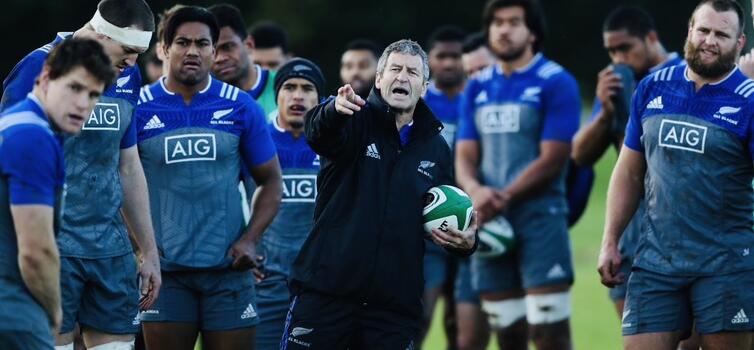Wayne Smith: Following the herd doesn’t cut the mustard

Smith has won two World Cups as assistant with the New Zealand All Blacks
Written by Simon Austin — October 23, 2019
FORMER New Zealand All Blacks Head Coach Wayne Smith has laid down the key tenets of his leadership philosophy, explaining why "following the herd doesn’t cut the mustard".
The 62-year-old is one of the most distinguished coaches in rugby union and was awarded the Steinlager Salver for exceptional service to the game in his home country last year. After being Head Coach of the All Blacks in 2000/1, he moved to England to take charge of the Northampton Saints for three years.
Then, in two separate stints, he was assistant with the All Blacks, playing a key role in their World Cup triumphs of 2011 and 2015.
Smith is now Director of Rugby with the Kobelco Steelers, Japan's Top League champions, and explained the cornerstones of his leadership philosophy to Rugby Pass. You can read the full interview, by Jamie Lyall, HERE.
1. OPPORTUNITY TO BE UNIQUE
Wayne Smith: What I do know is that following the herd doesn’t cut the mustard. Every team’s got the opportunity to be unique, whether it’s the language you use or the way you play. Following what everyone else does might get you mid-table. Being your own people and your own team is very important.
2. CREATE HAPPINESS AND POSITIVITY
Over the years of coaching, I’ve come to the conclusion that winning isn’t enough. Winning creates a short-term euphoria. But when you’re talking about mental wellness, happiness, optimism, it’s not necessarily going to create that.
I’ve got to the stage where I think, as a coach, I have a responsibility to ensure that we are creating happiness and positivity in the environment. Not to win, but to ensure that the players are battling these stresses and pressures they come under.
Every meeting that you have, there’s an opportunity to open up the meeting to have a skit or a competition or show a video to break the ice and get the boys laughing. It’s also a chance to bring out competitiveness, which is important in a team. You’ve got create opportunities to do stuff together and also have fun.
We might have a small competition amongst mini-teams up in front of the group, quizzes, there is all sorts of stuff we can do. But alleviating the pressures is really important. It’s a hell of a complex job to create a winning and competitive environment.
3. GIVE SOMETHING BACK
We wanted a dojo for our contact training that was lined with pads. Rather than going to the club, we built it ourselves and the players had to be part of that – measuring out the space, laying the mats, showing the club that you’re thankful for what they do for you and you’re prepared to give something back.
On a Wednesday morning, which is a day off, members of a mini-team will go and help with school patrol, making sure kids are safe crossing roads. Others will pick up rubbish around that vicinity. It’s not a publicity stunt, it’s just about doing something for other people.
We found that those sorts of things create an attitude of more positivity, a bit more resilience, generate more support from the community, and ultimately that helps your accomplishment. Having those sorts of mindsets is healthy for the people you are involved with and gives you a lot of satisfaction whether you win or not.
4. ADAPT, ADJUST AND OVERCOME
The Japanese are famous for their work ethic. They come out of high school and university quite instructed players. They’re used to being told what to do. The big challenge for me was to get them involved more in terms of answering questions, asking questions, coming up with ideas as part of a leadership group.
They’re beautiful, honourable, honest people and they will give you 100%, particularly if you tell them what to do. But the game isn’t about that. The game’s a multi-level decision-making game. You need them to be able to adapt, adjust and overcome situations. To do that, they need to be prepared to ask questions and find solutions.
5. HONESTY AND VULNERABILITY
Rather than it just being about coaches meeting with players, I had the players meet with each other and get honesty from each other. You’re trying to get to a level of excellence. We’re in high-performance sport.
If you're not at a level of excellence, you need to know - and it’s better coming from players than coaches.
It’s a big part of the All Blacks environment, a very honest environment, a very vulnerable environment. Young players are vulnerable with each other, it creates huge honesty and it’s a really positive environment.
That’s been a big focus for us and I know (Japan national coaches) Jamie Joseph, Tony Brown and Scott Hansen coach along similar lines. They have created a team that’s able to think on its feet and adapt to situations.





-1.png)





